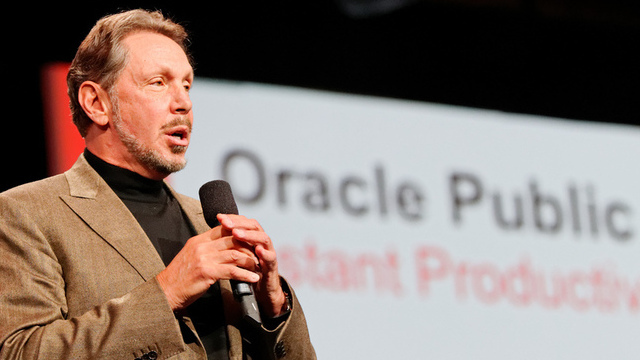
Oracle said this week that it's building a cloud service to host many of its key software products, including Java, database, middleware and CRM. As if anticipating concerns that the aptly named Oracle Public Cloud might be another vehicle for locking customers into Oracle software, though, CEO Larry Ellison tore into rival Salesforce.com, claiming Oracle will differentiate itself with industry standards and support for “full interoperability with other clouds and your data center on premise.”
The Oracle Public Cloud is a broad mix of platform-as-a-service and software-as-a-service, and a potential competitor to Salesforce, Microsoft, and others. The Oracle Fusion CRM Cloud Service and Oracle’s workforce management tools are already available, while the database and Java services, as well as a new business-focused social network, will be released “under controlled availability in the near future,” Oracle says. Oracle boasts the Public Cloud will provide “all the productivity of Java, without the IT,” and “the Oracle database you love, now in the cloud.”
“Beware of false clouds,” Ellison warned. He went on to claim that Salesforce, maker of CRM tools and the Force.com PaaS, is a proprietary cloud while Oracle is “standards-based,” due to its embrace of Java, BPEL, XML, SOA, Groovy and Web services. Oracle Fusion applications will run anywhere, including in the Oracle cloud, Amazon’s cloud, or in a customer’s data center, Ellison said. Salesforce, meanwhile, is “the ultimate vendor lock-in... stickier than a roach motel.”
“It’s easy to interconnect applications in our cloud to applications in the Amazon cloud, to applications in your data center, all using standards,” says Ellison, who has a long history with Salesforce.
Oracle vs. Salesforce.com
Ellison was one of the early investors in Salesforce.com. Yet this week Salesforce CEO Marc Benioff claimed that a keynote address he was supposed to deliver at Oracle OpenWorld was canceled by Ellison at the last minute after Benioff had criticized Ellison on Facebook, according to InformationWeek.
Ellison’s claims regarding Salesforce and Oracle’s own forthcoming cloud service have some grains of truth, but must be viewed at least partly as marketing. “Salesforce is proprietary,” says Gartner analyst Yefim Natis. “He’s correct. If you develop something for Salesforce that software will only run in one place, the Salesforce cloud.”
Still, Natis says “he’s not exactly right about lock-in of data. You can export data out of Salesforce and import it to anything you want.”
Whether Oracle-based applications will truly be interoperable with multiple clouds remains to be seen, says R "Ray" Wang, principal analyst and CEO of Constellation Research. Oracle offers standards-based development, but “there are no established open standards on public clouds that we know of,” Wang told Ars. Theoretically, applications built for Oracle Public Cloud can run in other cloud services. But “here’s the irony,” Wang says. “He says you can host it anywhere [in any provider’s cloud], but those providers may need Oracle appliances!”
“The point we're trying to find out is, ‘can I really host it anywhere?’” Wang continues. “We haven’t nailed that down yet.”
The Oracle Java Cloud Service will use the WebLogic application server, but the cloud version of WebLogic will offer only a subset of the full functionality available for on-premises deployments, which could complicate the goal of making applications portable from a private data center to the cloud, Natis says. Applications written for Java Enterprise Edition can be moved to a rival product like Red Hat’s JBoss or IBM’s WebSphere, whether it is an on-premises data center or a cloud service, but it may not be easy, he adds.
Oracle's cloud: A defensive strategy
From a business strategy perspective, the cloud offering is a defensive move on Oracle’s part, allowing its own customers to use Oracle software in the cloud or in their own data centers, hopefully preventing any movement to rival vendors, Natis says. But Oracle would prefer customers stick with on-premises software, presumably because it’s a more lucrative business.
“They never said anybody should take their application software and put it into the cloud,” Natis says. “They said you can if you want to. It’s understandable. They have a massive installed base, and they don’t want to disrupt anything that’s working.”
Unlike Salesforce and other rival clouds, Oracle isn’t using a multi-tenant infrastructure. This helps satisfy the needs of customers who don’t want their data co-mingled with others’, but could come at the expense of scalability, analysts say.
Listing image by Photograph by Oracle PR
reader comments
53